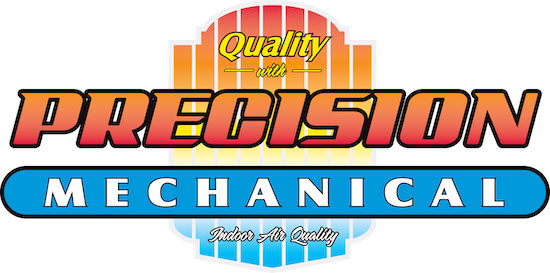
If you’re unsure whether your Rapid City home has unhealthy indoor air quality (IAQ), it likely does.
We are indoors a lot. As a matter of fact, we’re inside up to 90% of the time, according to the U.S. Environmental Protection Agency. And the air inside residences could be 2–5 times more polluted than outdoors, which can create long-term health problems.
Most Common Causes of Bad IAQ
We’ve put together a list of the most common sources of inferior IAQ, the problems they create and how you can fix these indoor air pollutants. If you’re troubled by the air inside your house, we suggest talking with a specialist like Precision Mechanical about which solutions are best for your family.
Volatile Organic Compounds
Volatile organic compounds, or VOCs, are vapors released by regular household products.
They’re found in paint and stains along with:
- Furniture
- Carpet
- Building materials
- Cleaning products
- Cosmetics
- Air fresheners
- Candles
When these vapors accumulate in your home, they can irritate your eyes, nose and throat. They can also cause headaches and nausea. Regardless of whether your home is in a rural or industrial space, an EPA study found indoor levels of these chemicals can be 2–5 times worse than the air outside.
Always adhere to the manufacturer’s instructions when using paint or cleaning supplies. Opening a window can help vapors disappear faster.
Air purification systems can also help. This unit partners with your heating and cooling unit to enhance indoor air. When hunting for a system, ensure it’s specifically designed to eliminate VOCs.
Dust and Pet Dander
Dust and pet dander can irritate health problems like asthma and allergies, especially when it continuously gets recirculated by your house’s comfort equipment. While you can vacuum more routinely and install an improved air filter, an air filtration system could be a better solution.
This solution hooks to your HVAC equipment to give mighty filtration. Some types provide hospital-level filtration for removing particles and bioaerosols.
Persistent Odors
Modern homes are tightly sealed to boost energy efficiency. While this is good for your utility expenses, it’s not so good for your IAQ.
Stuffy odors can hang around for a greater amount of time as your residence is pulling in reduced fresh air. Since keeping your windows open throughout the year isn’t an option, here are two ways you can make your indoor air smell better.
An air purification system is installed in your ductwork to neutralize odors before they get released again. Look for one with a carbon filter and the ability to wipe out dangerous VOCs. These systems can also help keep your loved ones healthy by wiping out most bacteria and normal allergy triggers like pollen and mold spores.
A ventilation system pulls out stuffy indoor air and replaces it with crisp outdoor air. There are two kinds of units (heat recovery and energy recovery), so call our professionals for more information on which kind is right for your home.
Uneven Humidity
It’s important your residence’s humidity keeps even. Air that’s too moist can create mold, while dry air can create respiratory symptoms.
Our pros suggest 40–50% for ideal comfort. To keep yours steady, think over getting a whole-home humidifier or whole-home dehumidifier with your heating and cooling system.
Instead of having to pull a humidifier from room to room, this product delivers balanced humidity around your house.
Carbon Monoxide
Carbon monoxide is colorless gas you can’t smell. It’s caused by insufficient combustion in fuel-burning units, like gas heating systems, water heaters or fireplaces.
It causes an extreme health risk. In little levels, it can lead to flu-like symptoms like headaches and nausea. It may be fatal in heavy levels.
We advise regular furnace maintenance to ensure your system is running like it should. This job allows our techs to pinpoint problems before they start, including malfunctions that can cause carbon monoxide leaks.
The best way to keep your house free of carbon monoxide is to put in detectors. These alarms must be on each floor close to bedrooms and living areas.
Enhance Your Residence’s Air Quality with the Precision Mechanical Pros
Informed that your home has poor air quality but not sure how to make it better? Or unsure which product is best for you? Give our approachable HVAC professionals a call at 605-206-3766 or contact us online today. With free estimates and professional service, we’ll help you locate the best solution for your family and budget.













